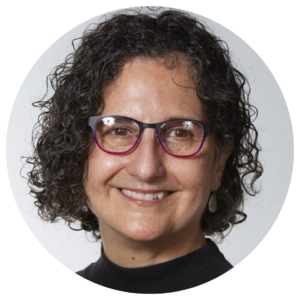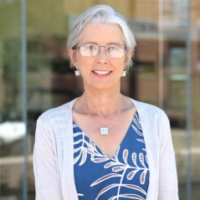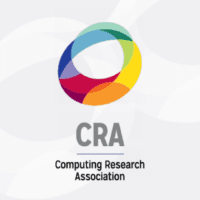Multiple CRA Programmatic Committees Welcome New Leadership
By Matt Hazenbush, Director of Communications
CRA’s programmatic committees are vital to advancing the organization’s mission, tackling a range of initiatives in leadership, policy, talent development, and research evaluation. Led by dedicated community volunteers and supported by CRA staff, these committees drive impactful programs and partnerships that support the computing research community.
Recently, several of CRA’s programmatic committees have welcomed new leadership. Here’s an overview of the committees and their new leaders.
CRA Widening Participation (CRA-WP)
The CRA Widening Participation Committee (CRA-WP) is dedicated to increasing diversity in computing research and education by creating pathways for underrepresented groups. CRA-WP provides mentoring, support, and resources across all stages of the research pipeline—from undergraduate to faculty levels.
New Leadership:
Soha Hassoun, Co-Chair
 Soha Hassoun is a Professor and former Chair of the Department of Computer Science at Tufts University, with secondary appointments in the Departments of Electrical and Computer Engineering and Chemical and Biological Engineering.
Soha Hassoun is a Professor and former Chair of the Department of Computer Science at Tufts University, with secondary appointments in the Departments of Electrical and Computer Engineering and Chemical and Biological Engineering.
Dr. Hassoun’s research sits at the intersection of machine learning and systems biology, focusing on developing tools to advance biological systems design. She received her BSEE from South Dakota State University, an MS from MIT, and a PhD from the University of Washington. Dr. Hassoun has received the NSF CAREER Award and multiple ACM/SIGDA service awards, including the Distinguished Service Award. She is a senior member of IEEE and ACM and co-founded the International Workshop on Bio-Design Automation.
CRA Government Affairs
The CRA Government Affairs Committee plays a crucial role in advocating for federal investment in computing research. As a trusted source for policymakers, the committee educates and advises on the benefits of computing research and provides expert testimony on science policy issues.
New Leadership:
Alex Aiken, Chair
 Alex Aiken is the Alcatel-Lucent Professor of Computer Science at Stanford University and a member of the CRA Board of Directors.
Alex Aiken is the Alcatel-Lucent Professor of Computer Science at Stanford University and a member of the CRA Board of Directors.
His research focuses on programming languages and their applications, and he holds appointments in Particle Physics, Astrophysics, and Photon Science at the SLAC National Accelerator Laboratory. Dr. Aiken earned his undergraduate degree from Bowling Green State University and his PhD from Cornell University. A fellow of ACM, Dr. Aiken has received the ACM SIGPLAN Programming Languages Achievement Award and the Phi Beta Kappa Teaching Award. He is a member of the CRA Board of Directors.
William Gropp, Vice Chair
 William Gropp holds a Grainger Distinguished Chair in Engineering and is the Director of the National Center for Supercomputing Applications at the University of Illinois at Urbana-Champaign.
William Gropp holds a Grainger Distinguished Chair in Engineering and is the Director of the National Center for Supercomputing Applications at the University of Illinois at Urbana-Champaign.
Known for his work in parallel computing and software for scientific computing, Dr. Gropp co-authored the widely-used MPI implementation, MPICH, and contributed to the PETSc library. He is a member of the CRA Board of Directors and holds a BS in Mathematics from Case Western Reserve University, an MS in Physics from the University of Washington, and a PhD in Computer Science from Stanford University. Dr. Gropp is a member of the National Academy of Engineering and a fellow of ACM, IEEE, SIAM, and AAAS.
Center for Evaluating the Research Pipeline (CERP) Advisory Committee
The Center for Evaluating the Research Pipeline (CERP) provides data resources and evaluation services to the computing community, conducting systematic research and program evaluations to support its mission of increasing diversity in computing research.
New Advisory Committee Members:
Dorian Arnold, Emory University
 Dorian Arnold is an Associate Professor of Computer Science at Emory University, specializing in distributed systems, fault tolerance, and high-performance computing environments.
Dorian Arnold is an Associate Professor of Computer Science at Emory University, specializing in distributed systems, fault tolerance, and high-performance computing environments.
His research explores performance, scalability, and reliability challenges in large-scale systems. Dr. Arnold holds a PhD and MS in Computer Science from the Universities of Wisconsin and Tennessee, respectively, and a BS in Math and Computer Science from Regis University. He is an ACM Distinguished Speaker and has held leadership roles in HPC venues, including the SC Conference.
Carla Corroto, Otterbein University
 Carla Corroto is a Professor of Sociology at Otterbein University, where she teaches courses on the sociology of race and ethnicity, gender, wealth poverty and inequality, and urban sociology.
Carla Corroto is a Professor of Sociology at Otterbein University, where she teaches courses on the sociology of race and ethnicity, gender, wealth poverty and inequality, and urban sociology.
Dr. Corroto’s research investigates the intersections of gender, race, social class, and disability in architecture and urban design. She holds a PhD in Sociology from The Ohio State University in Sociology and a Masters in Architecture from the University of Illinois, Chicago.
Wendy DuBow, NCWIT
 Wendy DuBow is a Senior Research Scientist and Director of Strategies for Education Research & Evaluation at the National Center for Women in Technology (NCWIT), with an affiliate faculty position in Women and Gender Studies program at the University of Colorado at Boulder.
Wendy DuBow is a Senior Research Scientist and Director of Strategies for Education Research & Evaluation at the National Center for Women in Technology (NCWIT), with an affiliate faculty position in Women and Gender Studies program at the University of Colorado at Boulder.
She oversees NCWIT’s research and evaluation efforts and conducts primary research focused on diversity in technology and organizational change in academia. Dr. DuBow earned her PhD from the University of North Carolina at Chapel Hill and has served as a principal investigator on numerous NSF-funded broadening participation in computing projects.
Ann Quiroz Gates, University of Texas at El Paso
 Ann Quiroz Gates is a Senior Vice Provost and AT&T Distinguished Professor of Computer Science at the University of Texas at El Paso, where she leads the Computing Alliance for Hispanic-Serving Institutions (CAHSI).
Ann Quiroz Gates is a Senior Vice Provost and AT&T Distinguished Professor of Computer Science at the University of Texas at El Paso, where she leads the Computing Alliance for Hispanic-Serving Institutions (CAHSI).
Dr. Gates’s research focuses on software engineering and broadening participation in computing. She is a recipient of the CRA A. Nico Habermann Award and the Anita Borg Institute Social Impact Award.
Kinnis Gosha, Morehouse College
 Kinnis Gosha is the Hortinius I. Chenault Endowed Professor of Computer Science and Executive Director of the Center for Broadening Participation in Computing at Morehouse College.
Kinnis Gosha is the Hortinius I. Chenault Endowed Professor of Computer Science and Executive Director of the Center for Broadening Participation in Computing at Morehouse College.
A member of the CRA Board of Directors, Dr. Gosha’s research focuses on conversational AI, social media data analytics, and culturally relevant computing. He holds over 60 peer-reviewed publications and has led initiatives supporting African American students in computing.
Ran Libeskind-Hadas, Claremont McKenna College
 Ran Libeskind-Hadas is the Founding Chair of the Department of Integrated Sciences at Claremont McKenna College and serves as Vice Chair of the CRA Board of Directors.
Ran Libeskind-Hadas is the Founding Chair of the Department of Integrated Sciences at Claremont McKenna College and serves as Vice Chair of the CRA Board of Directors.
His research focuses on computational biology, including evolutionary tree reconciliation algorithms. Dr. Libeskind-Hadas received his AB in Applied Mathematics from Harvard and his PhD in Computer Science from the University of Illinois Urbana-Champaign. He has also co-chaired CRA-E and served in various other leadership roles within CRA.
Kathryn McKinley, Google
 Kathryn McKinley is a Distinguished Engineer at Google, where she leads teams focused on optimizing Google Cloud’s infrastructure.
Kathryn McKinley is a Distinguished Engineer at Google, where she leads teams focused on optimizing Google Cloud’s infrastructure.
Previously a researcher at Microsoft and an endowed professor at the University of Texas at Austin, Dr. McKinley is known for her contributions to memory management and garbage collection technologies. She holds numerous awards, including the ACM SIGPLAN Programming Languages Achievement Award.
Sepi Hejazi Moghadam, Google
 Sepi Hejazi Moghadam is the Global Programs Lead for Research Solutions & University Relations at Google.org, he leads a team that engages with the global AI research community through programs, events, and collaborative research activities.
Sepi Hejazi Moghadam is the Global Programs Lead for Research Solutions & University Relations at Google.org, he leads a team that engages with the global AI research community through programs, events, and collaborative research activities.
Sepi has a Doctorate in Political Science and Education from Columbia University, a Masters in Policy Analysis and Evaluation from Stanford University, and a BA in Sociology from UC, Santa Barbara. Prior to joining Google, Sepi was a consultant at AT Kearney and Booz Allen Hamilton; and prior to being a consultant he spent ~10 years in the education sector with stops in the New York City Department of Education and Oakland Unified School District.
He’s a social activator, connector and strategist and a champion for equality and equity.
Christine Ong, CRESST
 Christine Ong is a Research Scientist at CRESST with over 10 years of experience in educational research and evaluation.
Christine Ong is a Research Scientist at CRESST with over 10 years of experience in educational research and evaluation.
She leads evaluation efforts for NSF-funded computing initiatives and previously worked as a research analyst for First 5 LA. Dr. Ong earned her PhD from the University of California, Los Angeles, and specializes in STEM education evaluation.
Gary Silverstein, Westat
 Gary Silverstein is an Associate Vice President for Education Studies at Westat, focusing on efforts to broaden STEM participation.
Gary Silverstein is an Associate Vice President for Education Studies at Westat, focusing on efforts to broaden STEM participation.
He provides evaluation and technical assistance to NSF, helping to design performance monitoring systems. Mr. Silverstein holds an MA in Public Policy and Administration from the University of Wisconsin and a BA in Political Science from the University of Michigan.
Get Involved With CRA
Interested in advancing the computing research community? CRA offers many ways to get involved. Complete our Get Involved Form to explore volunteer opportunities, committee roles, and other ways to contribute to CRA’s mission.
We’re also accepting nominations for the CRA Board of Directors. Serving on the board allows you to help shape CRA’s initiatives and support the future of computing research. Nominations are open until December 5, 2024. Submit your nomination here or contact elections@cra.org for more details.









